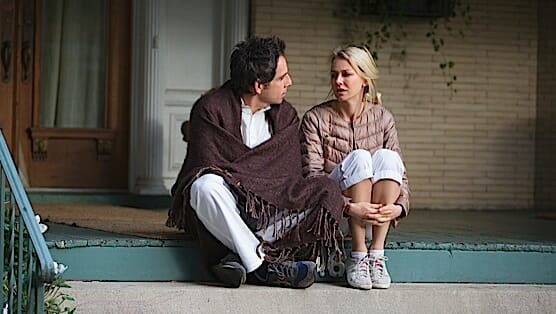While We’re Young (2014 TIFF review)

Writer-director Noah Baumbach, who’s in his mid-40s, last made Frances Ha, an affectionate film about a woman flailing through her late 20s, with his girlfriend, actress and co-writer Greta Gerwig, who was in her late 20s at the time. If Frances Ha was Baumbach’s very successful attempt at remembering the excitement and uncertainty of his younger years, then his new film is a witty report on where he is now—or, at least, the people he sees around him.
While We’re Young stars Ben Stiller and Naomi Watts as Josh and Cornelia, a 40-something married couple living in New York City. Cornelia produces her revered father’s documentaries—the father is played by the stellar Charles Grodin—while Josh is a once-promising documentarian who has spent a decade on his latest project, which might finally get done in about a decade from now. (Late in While We’re Young, Cornelia admits that one of the reasons she fell in love with Josh is that she saw a lot of her dad in him. One wonders if she was mistaken in that initial impression.)
Childless but relatively content—a couple miscarriages have convinced them that parenthood wasn’t in their future—Josh and Cornelia find their staid domestic lives interrupted by meeting Jamie and Darby (Adam Driver and Amanda Seyfried), who are almost the perfect representation of 20-something hipsters. A free-spirited married couple who love kitschy cultural detritus like Rocky III with utter sincerity, Jamie and Darby have an enthusiasm for new restaurants, trends and enlightenment movements that shakes Josh and Cornelia from their doldrums. (Plus, Jamie, an aspiring documentarian, knows and adores Josh’s older work, becoming the sort of admiring protégé Josh has always secretly wanted.)
The first half of While We’re Young, which Baumbach wrote solo, is just about comedic perfection. Mostly skewering Josh and Cornelia’s life of urban privilege, the filmmaker seems to be imagining what happens to all the Frances Halladays if they stick it out in New York, find jobs and mates, and discover that adulthood is just a series of bitter compromises. The impossibly romantic spirit of Baumbach’s last film, with its nods to the French New Wave and ’80s New Wave music, has morphed into a deceptively accessible and mainstream comedy in which the main characters are painfully aware how static and not-young they are.
-

-

-

-

-

-

-

-

-

-

-

-

-

-

-

-

-

-

-

-

-

-

-

-

-

-

-

-

-

-

-

-

-

-

-

-

-

-

-

-








































